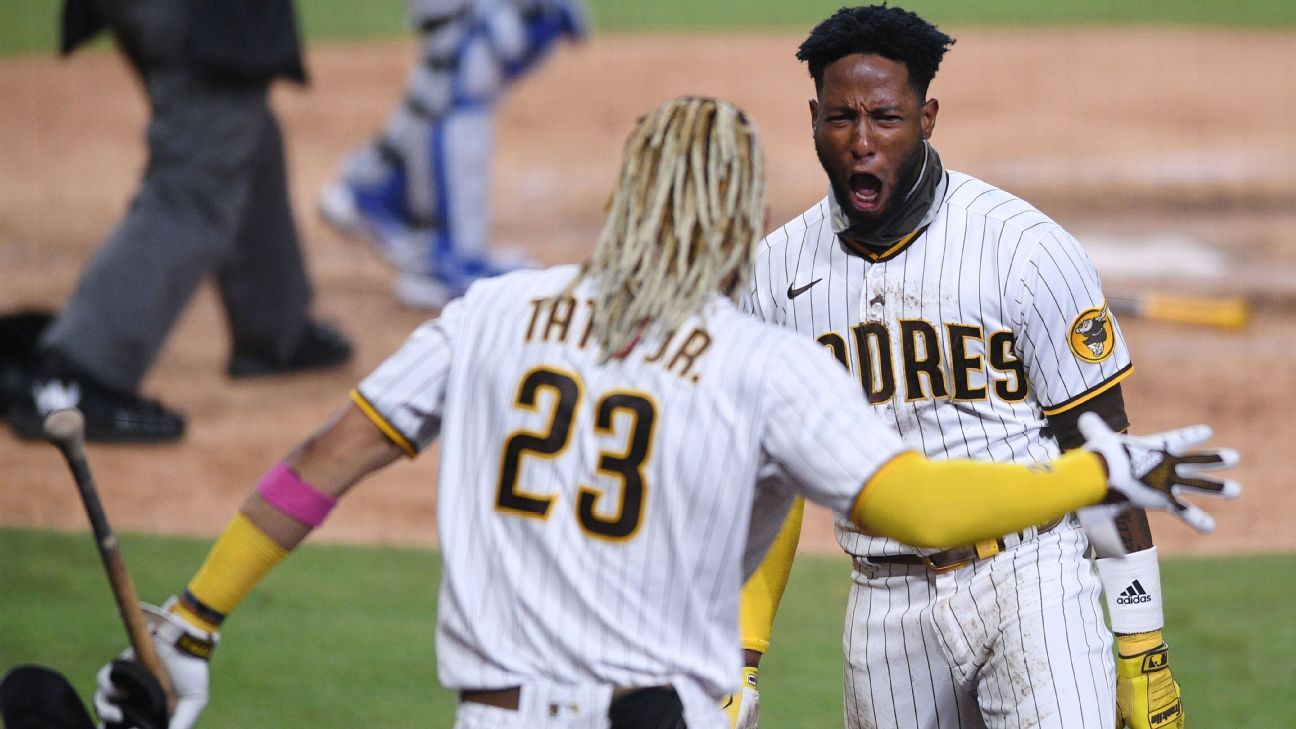If you had any doubt about whether this was real — whether Monday’s Major League Baseball game truly meant more than any had all year and whether the San Diego Padres had truly elevated themselves enough to become a legitimate threat to the mighty Los Angeles Dodgers — consider the disdain with which Trent Grisham homered off Clayton Kershaw in the sixth inning. An admiring glance, a swift turn towards his own dugout, a smug grin as he approached first base, an all-out dismissal of the esteemed pitcher who gifted him with a fastball out over the plate.
As Grisham neared home, Dodgers players on the edge of the third-base dugout berated him, and in that moment, it seems, the Padres became so much more than a charming, young, innocuous underdog.
They became a threat.
Grisham’s home run tied the opener of a three-game series and set the tone for the big seventh inning that allowed the Padres to distance themselves in an eventual 7-2 victory, giving them eight consecutive wins and pulling them within 1.5 games of first place in the National League West. Perhaps one day, if this upward trajectory goes as expected, it will become a seminal moment in a long-standing rivalry within a division that has long struggled to provide the Dodgers with a worthy opponent.
“It felt a little different,” Grisham said of the Padres’ first win against Kershaw since 2013. “It felt more satisfying.”
The Dodgers, winners of seven consecutive NL West titles, and the Padres, 14 years removed from their last postseason appearance, were less than three games apart when the penultimate week of this regular season began. The series opener in Petco Park represented what was arguably the most important Padres game in a decade, and both teams treated it with proper reverence.
Dodgers manager Dave Roberts strategized his batting order in a way he hadn’t all year, stacking three lefties near the top as a way of enticing the opposition to remove the menacing Dinelson Lamet when the lineup turned over a third time. Padres manager Jayce Tingler aligned his players so that Kershaw would face a right-handed hitter through eight of the first nine spots. Then the game started.
“You see Clayton has his best velocity of the season, you see Lamet sitting at 98, 99 for five innings — I thought both players, both dugouts, had energy,” Roberts said. “You can just feel the importance of the game.”
Roberts played in San Diego, coached in San Diego and still lives in San Diego. He has spent the last five years presiding over a Dodgers team that has consistently been among the sport’s greatest, guiding it through two World Series and eight elimination games. The experiences have naturally made Roberts cautious about magnifying regular-season moments. But he acknowledged beforehand — in this season, with expanded playoffs and few benefits to home-field advantage — that this was “a big series.”
“I can’t imagine what this place, in a normal year, the electricity in the stadium, and just all around the city, would be,” Tingler said three hours before Monday’s first pitch. “I wish we could experience it over the next three days.”
The Padres made their intentions clear last year, when they allocated $300 million for Manny Machado and placed Fernando Tatis Jr. and Chris Paddack on their opening day roster, eschewing modern baseball’s abuses of service-time manipulation. After a 70-92 finish from a team that was clearly on its way up, Padres executive chairman Ron Fowler declared that “heads will roll” if the Padres didn’t find themselves in contention in 2020.
The statement was a bit heavy-handed, perhaps even a little misguided. The Padres were seemingly at least another year away. But then they began the 2020 season with 18 wins in 30 games, and then their general manager, A.J. Preller, acquired at least six difference-making players in less than 48 hours without mortgaging a loaded farm system, and then it all started to feel real.
“It’s their reign,” Padres third baseman Manny Machado said of the Dodgers two days after the Aug. 31 trade deadline. “And it’s their division, honestly. But we’re coming’. We’re definitely comin’.”
The Dodgers — good as they are, proud as they are, accomplished as they are — can now feel it. It seemed evident in Monday’s bottom of the seventh, at the tail end of an otherwise magnificent Kershaw start. The Padres scored five runs in a half-inning that included three defensive miscues and very few hard-hit balls. Kershaw gave way to Pedro Baez with two on, one out and his pitch count at 99. He could only watch as Padres DH Jorge Ona legged a blooper into a double. Then Dodgers first baseman Max Muncy hesitated after fielding a grounder and let Jurickson Profar dart home. And then Dodgers infielder Chris Taylor seemed to lose Muncy’s throw in the lights. And then it all unraveled.
“We just kinda fell apart there,” Roberts said.
The Dodgers and Padres have split their eight games thus far, with three of them decided by three runs or less. They’ll meet two more times during the regular season and seem destined to meet again in the NL Division Series, regardless of how the top of the NL West shakes out.
Kershaw dismissed Grisham’s home-run celebration — “I’m not gonna worry about their team,” he said — and downplayed the potential of a budding rivalry.
“They’re a great team this year,” Kershaw said. “Eventually we might see them again in the playoffs.”
